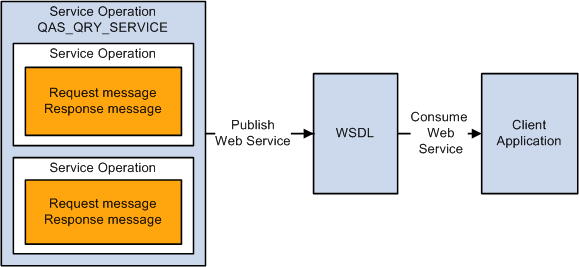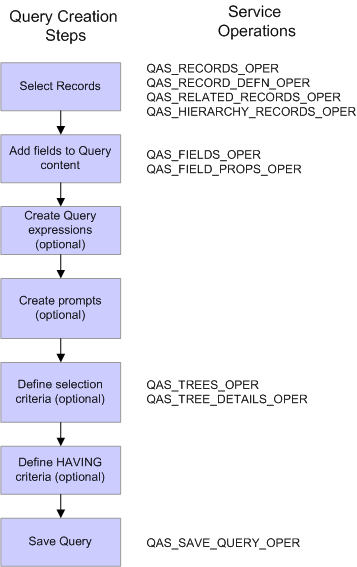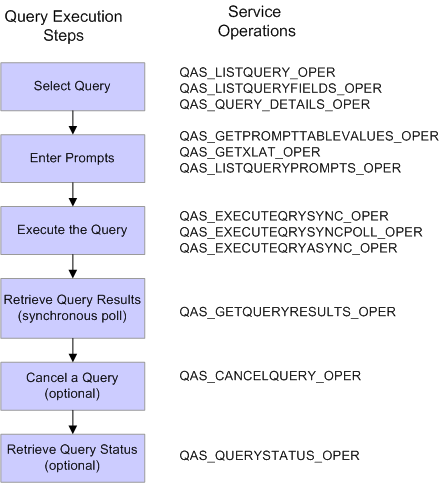 Query Access Service Operations
Query Access Service OperationsThis chapter discusses:
Query Access Service (QAS) operations
QAS Web Service
Use cases
 Query Access Service Operations
Query Access Service OperationsTo enable external applications to access PeopleSoft Query, a number of service operations are available. Depending on the application, the external application will need to use several service operations in combination. The service operations for QAS are part of the service QAS_QRY_SERVICE.
QAS service operations are grouped into the following categories to help describe the service operations:
Query Creation Services (QCS)
Query Security Services (QSS)
Query Metadata Services (QMS)
Query Execution Services (QES)
Note. No processing or security is dependent on the categories; they are simply groupings for describing the service operations.

 Query Creation Services
Query Creation Services
Query creation services are used by client applications to create and save a new query. This table lists the Query Creation Services:
|
Service Operation Name |
Description |
|
QAS_RECORDS_OPER |
Returns the list of records, along with descriptions, that are accessible to the user. |
|
QAS_HIERARCHY_RECORDS_OPER |
Returns the list of hierarchy records, if any, along with their descriptions. |
|
QAS_RELATED_RECORDS_OPER |
Returns the list of related records of all the fields in the record. |
|
QAS_RECORD_DEFN_OPER |
Returns the definition of a given record, including field descriptions and key information. |
|
QAS_TREES_OPER |
Returns the list of PeopleSoft trees that are accessible to the user. |
|
QAS_TREE_DETAILS_OPER |
Returns the tree details, including setID, effective date, and the list of all the nodes. |
|
QAS_FIELDS_OPER |
Returns the fields from all records that are accessible to the user. |
|
QAS_FIELD_PROPS_OPER |
Returns the properties of a given field. |
|
QAS_QUERY_DETAILS_OPER |
Returns the complete details of an existing query in XML format. |
|
QAS_SAVE_QUERY_OPER |
Validates and verifies XML-format query and saves the query in the PeopleSoft database. |
|
QAS_QUERY_DELETE_OPER |
Deletes the query from the PeopleSoft database. |

 Query Security Services
Query Security Services
Query security services are used to identify users and roles. This table lists the Query Security Services:
|
Service Operation Name |
Description |
|
QAS_AUTHTOKEN_OPER |
Returns the user ID based on the PS Token passed in. |
|
QAS_LISTROLE_OPER |
Returns the list of roles, along with descriptions. |
|
QAS_LISTUSER_OPER |
Returns the list of users, along with descriptions. |
|
QAS_LISTROLEUSERS_OPER |
Returns the list of users for a given role, along with descriptions. |
|
QAS_LISTUSERROLES_OPER |
Returns the list of roles for a given user, along with descriptions. |
|
QAS_LOGIN_OPER |
Enables the client application to sign on to the PeopleSoft database. |

 Query Metadata Services
Query Metadata Services
Query metadata services are used to extract application data from the PeopleSoft database. This table lists the Query Metadata Services:
|
Service Operation Name |
Description |
|
QAS_LISTQUERY_OPER |
Returns the list of queries, along with the query descriptions, and owner type. |
|
QAS_LISTQUERYPROMPTS_OPER |
Returns a list of prompts used in a specific query. |
|
QAS_LISTQUERYFIELDS_OPER |
Returns a list of fields for a given query. |
|
QAS_GETXLAT_OPER |
Returns the translate value for a given field. |
|
QAS_GETPROMPTTABLEVALUES_OPER |
Returns a list of field values for a given prompt. |

 Query Execution Services
Query Execution Services
Query Execution Services are used to run the query from a third-party application. This table lists service operations used to execute a query:
|
Service Operation Name |
Description |
|
QAS_CANCELQUERY_OPER |
Returns the status of query cancellation. |
|
QAS_QUERYSTATUS_OPER |
Returns query execution status. |
|
QAS_EXECUTEQRYSYNC_OPER |
Returns query result. |
|
QAS_EXECUTEQRYASYNC_OPER |
Returns query result. |
|
QAS_EXECUTEQRYSYNCPOLL_OPER |
Runs the query through process scheduler and returns the query instance ID. The service operation QAS_GETQUERYRESULTS_OPER is used to retrieve the results. |
|
QAS_GETQUERYRESULTS_OPER |
Used to return the query results when the query is executed on the PeopleSoft database using QAS_EXECUTEQRYSYNCPOLL_OPER. |
 QAS Web Service
QAS Web ServiceThis section provides an overview of the QAS web service named QAS_QRY_SERVICE and discusses:
WSDL (Web Services Description Language) document
Message schema
SOAP template

 Understanding QAS_QRY_SERVICE
Understanding QAS_QRY_SERVICE
Services are used to logically group a set of service operations. The service QAS_QRY_SERVICE contains all of the service operations for QAS. When you publish a web service, a WSDL document is created containing all of the selected service operations as well as the endpoints based on the service configuration.
QAS_QRY_SERVICE is delivered as a restricted service. Only a user with the Peoplesoft Administrator role can make changes to the restricted state.
See Setting Service Configuration Properties.
See Restricting and Enabling Write Access to Service Definitions.
This diagram illustrates how a client application consumes the web service:

Providing a web service
The published web service is stored in the WSDL Repository. Client applications consume the WSDL by accessing the WSDL URL from the repository. The WSDL for QAS_QRY_SERVICE is delivered and updated with the appropriate WSDL Repository location whenever the target location is updated on the Service Configuration page (Select PeopleTools, Integration Broker, Configuration, Service Configuration).
See Setting Service Configuration Properties.

 WSDL Document
WSDL Document
To view the generated WSDL Repository for the QAS_QRY_SERVICE, click the View WSDL link on the service page (select PeopleTools, Integration Broker, Integration Setup, Services).
All of the service operations contained in the WSDL are listed in the Exported Service Operations section. Use the View WSDL link to view the WSDL document.

 Message Schema
Message SchemaThe WSDL document is created using the request and response message schemas for each service operation. To view the message schema, select PeopleTools, Integration Broker, Integration Setup, Messages and select the message to view. Select the Schema tab to view the schema.

 SOAP Template
SOAP TemplateFor each service operation, you can use the Generate SOAP Template utility to generate SOAP message templates for request messages, response messages, and fault messages found in the WSDL document. The generated SOAP template will include WS-Security SOAP Header tags. You can then use the templates to test SOAP messages in your third-party application.
Note. WS-Security should be used with all QAS service operations.
See Implementing Web Services Security.
 Use Cases
Use CasesThis section discusses the two most common use cases for QAS::
Create a Query
Execute a Query

 Creating a Query
Creating a QueryQAS provides several service operations that can be used by an external application to access the PeopleSoft application database to select records and fields to create a valid PeopleSoft Query. Creating a query involves several steps, some of which do not require access to the PeopleSoft records, fields, and trees and therefore do not have associated service operations. This diagram illustrates the steps and corresponding service operation that can be used to access the PeopleSoft database information:

Steps to create a query
You can use QAS_RECORDS_OPER, QAS_RECORD_DEFN_OPER, QAS_RELATED_RECORDS_OPER, and QAS_HIERARCHY_RECORDS_OPER to select records.
QAS_FIELDS_OPER and QAS_FIELD_PROPS_OPER can be used to help select the fields and prompts to add to the query content.
QAS_TREE_OPER and QAS_TREE_DETAILS_OPER can be used when your selection criteria uses trees.
The QAS_SAVE_QUERY_OPER is used to save a query definition to the PeopleSoft database.

 Executing a Query
Executing a QueryTo execute an existing query in the PeopleSoft database, the external application will use Query Metadata Services, Query Execution Services, and possibly the Query Result Service. This diagram illustrates the steps and corresponding service operations that can be used to execute a PeopleSoft query and retrieve the results:

Steps to execute a query
To execute a query, you will need to know the query name. QAS_LISTQUERY_OPER, QAS_LISTQUERYFIELDS_OPER, and QAS_QUERY_DETAILS_OPER can be used to help select the query name.
For queries containing prompts, use QAS_GETPROMPTTABLEVALUES_OPER, QAS_GETXLAT_OPER, and QAS_LISTQUERYPROMPTS_OPER to identify the prompts and obtain a list of values.
You can also filter fields to be retuned in the query results using QAS_LISTQUERYFIELDS_OPER.
You can select how you want to execute the query and use the appropriate service operation.
For synchronous poll execution, you will use QAS_GETQUERYRESULTS_OPER to retrieve the results.
You can invoke QAS_CANCELQUERY_OPER after obtaining the query result to clean up the PSQASRUN and IB tables.
You can check the query status using QAS_QUERYSTATUS_OPER.